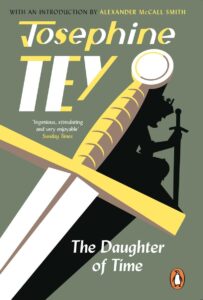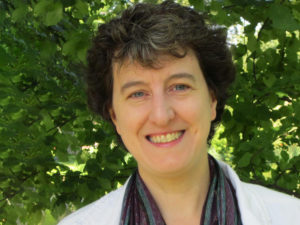Each month, we ask a member of faculty to tell us about one book that played an outsized role in making them who they are today. This month’s contribution to Words to Live By, by Dr. Rohan Maitzen, Associate Professor of English and a King’s-Dalhousie Carnegie professor, helped shape her love of history as an irresistible mystery to be investigated.
What book have you chosen?
 I have chosen The Daughter of Time, by Josephine Tey. For those who don’t know it, this is a classic but also extremely idiosyncratic mystery novel in which Tey’s Scotland Yard detective, Alan Grant, laid up and bored in the hospital, undertakes an investigation into the mystery of the Princes in the Tower, allegedly murdered by their uncle, Richard III. Grant, who prides himself on his ability to read faces, is motivated by his apparent misreading of Richard’s portrait, which (before he knows its subject) looks to him like a face that belongs on the bench, not in the dock. The more he looks into the evidence, the more Grant becomes convinced that far from being a villainous usurper, Richard was a good, just, and much maligned ruler.
I have chosen The Daughter of Time, by Josephine Tey. For those who don’t know it, this is a classic but also extremely idiosyncratic mystery novel in which Tey’s Scotland Yard detective, Alan Grant, laid up and bored in the hospital, undertakes an investigation into the mystery of the Princes in the Tower, allegedly murdered by their uncle, Richard III. Grant, who prides himself on his ability to read faces, is motivated by his apparent misreading of Richard’s portrait, which (before he knows its subject) looks to him like a face that belongs on the bench, not in the dock. The more he looks into the evidence, the more Grant becomes convinced that far from being a villainous usurper, Richard was a good, just, and much maligned ruler.
How and when did you come across this book?
I think I first read it when I was 11 or 12. At any rate, I know that it was one of my favorite books in sixth grade, when it inspired me to join the Richard III Society of Canada. (At the one meeting I attended I was, perhaps unsurprisingly, the youngest person present, by several decades.) My original copy, which I still have, was almost certainly a gift from my mother. She excelled at choosing books for me that became lasting favorites—around the same time, she also gave me Dorothy L. Sayers’s Gaudy Night and Dorothy Dunnett’s The Game of Kings, both of which are still in my top 10.
What was it about the book that first stood out to you?

I had always loved historical fiction, but until I read The Daughter of Time I hadn’t thought about how the stories I devoured in this genre were told—or, more importantly, as Tey taught me, how else they might have been told. I found this fascinating! But what I responded to the most was the idea of a historical underdog, of someone whose story had been unfairly distorted. It was a cause perfectly suited to someone who by nature and habit was bookish and introverted: I loved the idea that you could help right a wrong by reading books and writing about what you found!
How did this book shape you?
For one thing, feeling that I stood for something, even something that to most people probably seems trivial as well as Quixotic, gave me more self-confidence by showing me the strengths of what I often felt were liabilities—such as being bookish and introverted! It was heartening to discover that these were traits that could be put to good use.
I am no longer a member of the Richard III Society, and I’m not as sure as I once was of Richard’s innocence. But the lingering effects of The Daughter of Time show across my academic career. I first learned from Tey that historical facts and evidence always need to be interpreted and to be woven into a narrative, and that point of view is a critical factor in this process. She also introduced me to the limits of conventional historical approaches—to the things that they can’t do or include, and to the role that fiction can play in complementing, supplementing, or compensating for those constraints.
I never lost my interest in the difference genre makes to the way we tell stories about the past, and to the kind of stories we can tell. As an undergraduate, I did a combined degree in English and History; my Honours thesis compared Thomas Carlyle’s The History of the French Revolution and George Eliot’s Middlemarch as works of history and works of fiction. My Ph.D. thesis looked at Victorian women historians and, again, at George Eliot’s fiction; it became my first book, called Gender, Genre, and Victorian Historical Writing. In other words, I have never stopped thinking about the kinds of questions that preoccupy Alan Grant as he tries to figure out who Richard III really was from the incomplete and competing accounts left in the historical record.
What do you think it is about this book that made such an impact?
By giving her historical inquiry the structure of a detective novel, Tey gives Richard’s story a kind of urgency that you don’t always find in more straightforward accounts of the past. Like all mysteries, too, The Daughter of Time is really about a lot more than a single crime: it raises questions about truth, justice, evidence, power and politics. Who looks guilty at first, and why? Whose testimony do we believe? Who controls the narrative? What are the stakes? What would a just outcome look like? These are always good questions to ask, not just when reading a whodunit.
Have you reread this book? Does it resonate differently today than it did on first reading?
I have returned to it many times, most recently right before answering your questions. It retains all of its charm.

